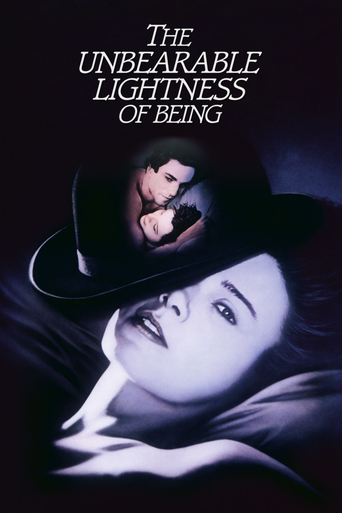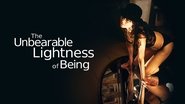craig-20741
I don't know why Kunderas didn't like the movie. Maybe because the movie was actually better than the book. No spoilers, but I'll just say that there were a few subtle yet significant changes in the film that made this movie a truly moving experience.
roddekker
According to a number of reviews that I've read (here on IMDb) - This 1988 movie was, apparently, an absolute corruption of the novel, which was written by Czech-writer, Milan Kundera, in 1984.Perhaps this was so (I haven't read Kundera's book) - But I will tell you one thing that's totally true - At a 3-hour running time, "The Unbearable Lightness Of Being" was, indeed, totally unbearable to tolerate.Regardless of containing some deliberately distracting, soft-core erotica, thrown into the story for good measure, the love-triangle that transpired between Tomas, Tereza and Sabina was such a tiresome, little, cry-baby affair that any gratuitous sexuality wedged into the action only served to render the rest of the story as being nothing but a blasted bore.Set in Prague in the year 1968 - Believe me, this film was very-very dry storytelling.And, I think that that dullard, actor, Daniel Day-Lewis, was totally miscast as the fickle, conceited, playboy doctor who seemed to spend a good part of his waking hours dutifully jumping in and out of bed with one babe after another.
paul2001sw-1
Milan Kundera's philosophical novel 'The Unbearable Lightness of Being' was always going to be difficult to film, a story of lives lived, ordinarily, against a backdrop of politics and eroticism. Philip Kaufamn's attempt is long, has a wonderful score, chooses to have its cast speak English in eastern European accents, showcases Juliet Binoche's beauty, and I think succeeds in avoiding the heaviness, the moral weight, that the story's characters find fundamentally absent from the business of simply being alive from one moment to the next. What it doesn't quite capture is the novel's intellectual playfulness, the authorial wisdom within which the original story was set, which in the book substitutes for the enforced narrative drive of most novels. Whereas some films are best enjoyed by those who haven't seen the source material, this one might work best for those who have: otherwise, some audiences could miss the point. Nonetheless, the ending is strangely affecting and true to the original story; and Daniel Day Lewis surprisingly good as a middle class Czech philanderer.
Hitchcoc
It was hard to keep aesthetic distance after reading so much review material before seeing this. I have to agree with those that criticize the length. There is a sense of rambling and lack of meeting of forces that turned me off a little. I thought a little tweaking of this would have made the film get to its point. Nevertheless, I didn't say it isn't a decent film. While I find self-indulgent types like these hard to take, they certainly light up the screen. Here are some of the best actors of our time. There is also a political threat that is nicely intertwined among the rest of the love story. I felt sorrow for the young woman who just wanted to be cared for. She is dealt a nasty hand. But if you know it's a snake, be ready to be bitten, as the old fable tells us. The strongest part of this is the cinematography. Cameras within cameras, sharp, insightful scenes put before us, subtle facial expressions, all this. I've never read the book, but I feel I may need to do so. Perhaps with a more insightful character development only a novel can give, I would enjoy the people more.







